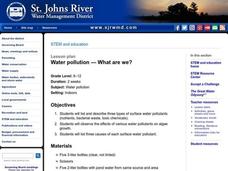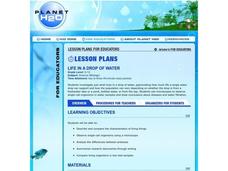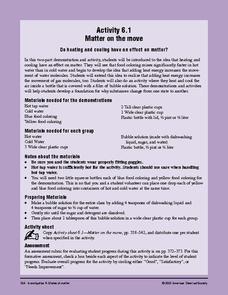Curated OER
Water Filtration
Students design a filtration system using three filtration materials. In this water filtration lesson, students conduct an experiment with their filtration systems. Students present their systems to the class. Group results are...
Curated OER
A Very Simple Conductivity Meter
Middle schoolers investigate the hardness of different water samples using the conductivity meter. In this chemistry lesson, students build their own meter following specific procedures. They identify an unknown sample of water.
Curated OER
What Are We?
Students list and describe three types of surface water pollutants. They observe the effects of various water pollutants on algae growth. Three causes of each surface water pollutant is listed.
NOAA
Ocean Layers I
How is it possible for ocean water to have layers? The sixth installment of a 23-part NOAA Enrichment in Marine sciences and Oceanography (NEMO) program investigates factors that cause different water densities to occur. Experiments...
Curated OER
Making a Water Filter
Fifth graders draw a plan that they think will clean the sludge in a jar. Students construct the treatment system they designed, take a bottle of sludge to the system and try it out, writing down what happened.
Curated OER
Life in a Drop of Water
Students examine the structure, function, and characteristics of microscopic organisms that inhabit freshwater through collection of water samples and observation through microscopes.
Curated OER
Water Filtration Competition
Students design water filtration systems. They draw sketches and write paragraphs about their systems. After presenting their systems to the class, each group then builds their system and determines its effectiveness for purifying...
Curated OER
Water Quality
Students investigate the water cycle and evaporation. They study the porosity and permeability of groundwater, and the capillary action in soil in this unit.
Curated OER
Breaking News English: Tap Water as Good as Bottled Water
In this English worksheet, learners read "Tap Water as Good as Bottled Water," and then respond to 47 fill in the blank, 7 short answer, 20 matching, and 8 true or false questions about the selection.
Curated OER
Water Taste Test
Students brainstorm the different characteristics of potable water. In this general science lesson, students test several water samples and hypothesize which samples and brands they are. They discuss where drinking water came from and...
Curated OER
Water, Water, Everywhere (High School)
High schoolers view different types of water to make the point that salt or polluted water isn't useful for drinking water. They chart causes, consequences and solutions to water scarcity based on internet research. They write an essay...
Curated OER
Water Density Boundaries
Young scholars create observable layers in water that represent a separation based upon density differences. They model density boundaries using differences in temperature and salinity. They, in groups, perform a meaningful experiment...
Curated OER
Devising a Set of Experiments to Test Water for Dissolved Substances
High schoolers work together to test water samples for pollutants. They design data tables to collect and record their observations. They complete discussion questions to end the lesson.
Curated OER
Hypothermia
In this hypothermia worksheet, students test room temperature water against outside wind and see what happens to a thermometer's temperature. Students follow 9 directions and answer 9 questions.
Curated OER
Save Water
For this water conservation game, learners collaborate with classmates to play a game about saving water. Students form groups and use the provided game boards and pictures to study water conservation.
Curated OER
What's the Difference Between Concentration and Solubility?
Young scholars discuss the difference between concentration and solubility as well as examine the difference in a hands-on activity. Using water and table salt, they experiment with solubility. They create different concentrations using...
Curated OER
Driving Currents
Students conduct a variety of investigations to see how water, heat, and salinity affect the flow of the world's ocean currents,as well as, explore many factors that affect the flow of the world's ocean currents. They also describe in...
Curated OER
The Open Ocean, What is it and How Does it Change?
Students investigate the ocean environment. For this ocean lesson, students discover the physical properties of the ocean. Over two days, students work in small groups investigating ocean maps and creating water currents.
Curated OER
Water Density
Students identify and analyze the concept of density using the formula, density equals mass divided by volume. They review the differences in salinity levels of the ocean and note that the changes in density are caused by wind and...
American Chemical Society
Matter on the Move
Start this mini unit on matter out by demonstrating how food coloring behaves when placed in cold and in hot water. Then have the class experiment with warm water and soap film. Pupils will learn that an increase in thermal energy also...
American Chemical Society
Defining Dissolving
Physical science investigators mix sugar and food coloring into different cups of water and cooking oil to compare how the solid and liquid behave in each. As the introduction to this unit on dissolving, it is relevant.
Curated OER
Science: Headline
Young scholars are able to identify questions they need to answer to comprehend a specific news article. They are pushed to question how they know that their drinking water is safe.
Curated OER
Investigating Earth's Materials
First graders compare and contrast water from different sources. After collecting water from various sources, 1st graders create a list of observable properties of the water. Students then pour the water into a filter and observe the...

























